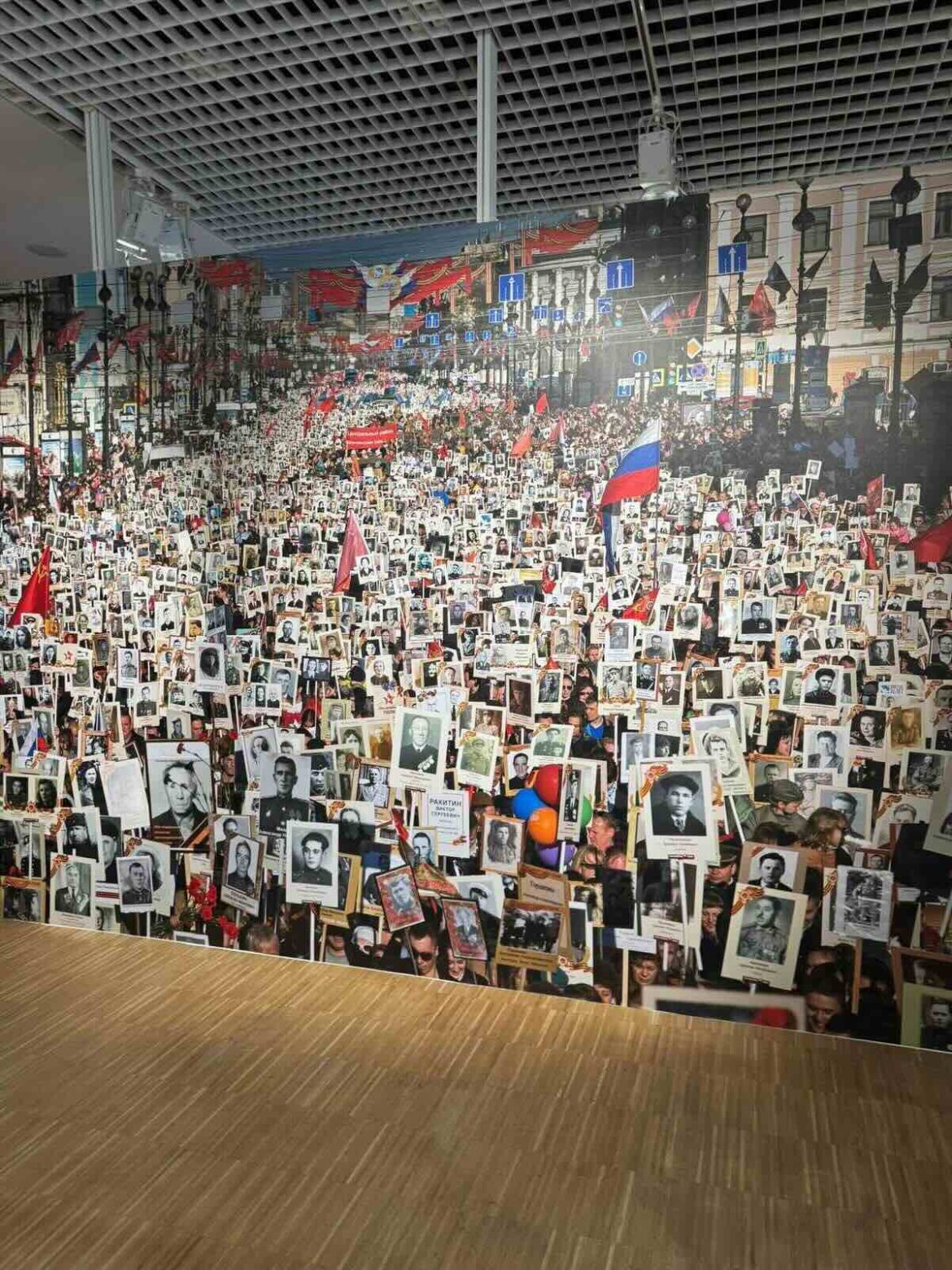Presence of the Past – a European Album, the House of European History’s temporary exhibition in Brussels (running to 11 January 2026), promises to show how Europeans engage with history in daily life.
A section titled “Post-heroic commemorations” presents grassroots rituals as acts of healing. Dominating one gallery is a wall-sized photograph of Russia’s “Immortal Regiment” march. Set against Russia’s ongoing aggression against Ukraine, and its portrayal of Ukrainians as “Nazis”, this curatorial choice normalises a live propaganda format rather than interrogating it. The museum asks what we seek in the past; here, it appears not to ask how the past is being instrumentalised in the present.
The Immortal Regiment began as a local initiative in Tomsk in 2012: people walked on 9 May carrying portraits of relatives who had fought or died in the Second World War. The format spread quickly. From 2015, however, the ritual was folded into the state’s Victory Day repertoire: a centralised structure, “Immortal Regiment – Russia”, emerged, backed by official funding and loyal personnel. What began as a family-centred act of remembrance became a stage-managed spectacle that links the wartime past to current policy.
That policy is explicit. Since 2014, and especially since the full-scale invasion of 2022, Moscow has cast Ukraine as “Nazi” and framed the war as a continuation of 1941–45. The Regiment’s visual grammar—portraits on sticks, massed columns, and the black-and-orange St George ribbon—bridges private grief to a state narrative of moral mission. Russian cultural fronts, including Russia Houses and allied NGOs, have promoted the format abroad as soft power, providing materials and messaging.
The museum’s photograph might have been defensible with firm contextualisation. Instead, visitors are left to supply it. On a guided tour, Ukrainian guests challenged the image. One called it “propaganda”; another noted that the march now honours a militarised narrative that legitimises new violence. When the guide suggested the marchers carried portraits of “victims of the Second World War”, the group replied that the contemporary choreography teaches people to come to Ukraine and “destroy the innocent”, with 9 May as a focal point. In a permanent gallery the same tour paused at a perforated door from a blue civilian car recovered near Irpin; a visitor explained that Russian forces have repeatedly targeted civilians. The guide’s reported response—“Really?!”—spoke to a troubling gap in preparation for a European institution presenting a live, contested memory form.
The museum’s broader premise—that grassroots commemoration heals—sits uneasily with the Regiment’s current use. The question is not whether individual participants mourn sincerely; many do. It is whether an exhibition should enlarge and aestheticise a state-managed ritual whose present function is to legitimise an ongoing war and to brand the invaded as “Nazis”. Without plain words on appropriation and messaging since 2015, the display risks laundering a propaganda device into the European canon of remembrance.
Russia’s external push reinforces the point. After co-opting the movement, the state promoted Regiment marches in dozens of countries, often through diplomatic posts and compatriot networks. The Ukrainian World Congress has warned of the format’s use to centralise control over wartime narratives, inflate the USSR’s role, and accuse Western states of “rewriting history”. Plans publicised this year name events in the United States, Canada, Italy and Greece. The intent is less mourning than message discipline.
Host governments have begun to draw lines. Moldova outlawed the St George ribbon in 2022. Estonia bans symbols supporting Russian aggression and has not permitted “Immortal Regiment” processions for several years. In Germany, the Berlin Administrative Court has upheld police bans on Russian and Soviet flags around 8–9 May. Beyond the EU, several Kazakh cities blocked Regiment-style marches ahead of 9 May 2025. These actions do not reject remembrance; they recognise how the format now functions.
Presence of the Past asks whether people seek identity, social connection or community when they connect with history. A sharper exhibition would put those fair questions alongside a clearer account of how the Russian state has privatised Victory Day, re-scripted the Immortal Regiment, and exported it as an instrument of influence. That would include: the movement’s origin and state takeover; the “anti-Nazi” framing of Ukraine; the role of the St George ribbon since 2014; and the legal and administrative responses across Europe.
A practical fix is available. Keep the photograph, but rewrite the label to reflect the movement’s trajectory and present purpose; note the export drive; and acknowledge European restrictions where authorities have judged the format inseparable from propaganda. Without that context, a Brussels museum ends up echoing a narrative crafted in Moscow—and asking Ukrainian victims of a current war to accept it as a “healing” ritual on a gallery wall.


